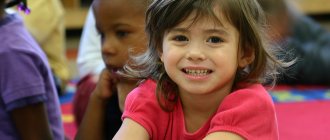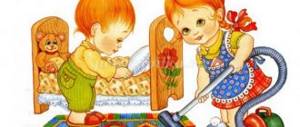How to cultivate kindness in a child?
Today, the problems associated with the moral culture of the individual, which manifests itself in relationships between people, in the manifestation of such moral qualities as kindness, mercy, empathy, and willingness to understand others, are especially acute.
The problem of moral education has been of interest to pedagogical science for many years. At all times, such qualities as kindness, justice, mercy, honesty, responsiveness, and respect for people have been valued in people. These qualities were proclaimed as particularly valuable categories in the works of Ya. A. Kamensky, I. G. Pestalozzi, A. Disterweg, K. D. Ushinsky and others.
In the period after the October Revolution in Russia, the theory of moral education underwent significant revision; as a result, the idea of eternal and unchanging morality was rejected, and the class nature of morality was emphasized. As a result, for many decades in the educational process preference was given to ideological and political education to the detriment of moral education. But the best teachers in their activities proceeded, first of all, from the education of deeply moral qualities of the individual. Thus, the need to instill moral qualities and moral behavior in children was paid attention to by A. S. Makarenko, who paid special attention to the formation of moral relations in a children’s team, and V. A. Sukhomlinsky, who showed the close connection of moral education with the development of the child’s emotional sphere, his ability to experience , rejoice for others, who embodied his views in practical activities, Sh. A. Amonashvili, who paid special attention to the influence of the relationship between teacher and children, parents and children on the process of moral education, and others.
The problem of moral education today is of particular relevance. Underestimation of the education of moral qualities results in flaws in the appearance of the entire society. Today, the lack of morality has become the source of many contradictions observed in our lives. Increasingly, manifestations of indifference, intolerance, and aggressiveness between people are observed, which makes the process of educating moral qualities in children especially necessary.
In our kindergarten, a study was conducted to identify the level of preschoolers’ ideas about such moral qualities as “kindness”, “mercy”, “culture of behavior”. Children in a school preparatory group of 20 people were examined. During the study, we used the method of problem situations. The children were offered game situations in which they had to make a moral choice. Situations included the following:
1 situation . A study of the manifestation of mercy.
Children play in the yard. Suddenly one of them fell and was seriously hurt. He cried in pain.
2 situation . Exploring acts of kindness.
During class, Masha drew a tree. Suddenly her green pencil broke. She's upset. He tells his friend: “I pressed hard and broke the pencil.”
3 situation . Study of culture of behavior.
A boy (girl) returns home from kindergarten. Another boy comes towards him, accidentally touches him and says: “Sorry!”
Children chose different behavior options in these situations. Some of them, who showed a high level of moral ideas, in the “mercy” situation stopped the game, calmed down their friend, and provided first aid; in the “Kindness” situation they sympathized with Masha and offered their pencil; in the “Culture of Behavior” situation, they calmly reacted to what happened, answering: “It’s okay! ", "Happens! ”, etc. Others - in the first situation, showed sympathy in words (“Well, how can you do that!”, “It hurts,” “Don’t cry,” etc.); in the second situation they suggested turning to the teacher for help, in the third situation they expressed displeasure: “You need to watch! " etc.
Still others either did not pay attention to their comrade who was in trouble, laughed at him, teased him; They did not show sympathy for the girl who broke the pencil (“You shouldn’t have pressed so hard”) and entered into a conflict.
An analysis of the research results showed that in children, the average level of formation of good feelings, ideas, and adequate behavior predominates, i.e., children understood the plight of a friend, sympathized with him, but did not express a desire to help with deeds. The results obtained confirmed us in the idea that systematic and purposeful work on the moral education of preschool children is necessary.
Moral education of children is a rather complex process. Over time, the child gradually masters generally accepted social norms of behavior and relationships. But this path is long, not always effective and does not provide depth in the development of morality. Therefore, the role of the adult with the help of whom this process is carried out is so important. The source of the development of kindness, mercy, and empathy in a preschooler is relationships with loved ones. Children early begin to feel the kindness and fairness of adults and peers, and are sensitive to manifestations of hostility. It is very important that they extend humane feelings not only to themselves, but to be able to sympathize with other people and be merciful. A child must know what it means to be merciful, honest, fair, kind, etc. Children must be able to answer questions about why one needs to be this way, to act one way and not another. By teaching children to think about their actions, we develop their consciousness. For this purpose, when working with children, we use group and individual conversations about the kind deeds of people, enriching their speech with words such as “kind”, “sensitive”, “responsive”. Most often, such conversations are held after reading works of fiction. So, in a conversation based on the story by Ya. Segel “How I Was a Mother,” the goal of which is to make children want to take care of the kids (feed, amuse, sing a song, help get dressed), after reading the story, the teacher invites the children to think about the questions:
• What did you like about the story?
• What do you think little Sasha’s parents could have thanked Yasha for?
• Do you think feeding a small child is difficult work? What does the author say about this?
• How did Yasha persuade Sasha to eat? How did he put him in a good mood?
• How did Yasha put the baby to bed?
In conclusion, the teacher tells the children that the teacher of the younger group asked to send assistants to her. When asked who would like to help the kids, all the children raised their hands, which indicates the effectiveness of the conversation.
Reading to children the Nenets fairy tale “Cuckoo” - about how a mother turned into a cuckoo and flew away from her unkind, callous sons, we ask the children: “Do you feel sorry for your sons? ", thereby trying to lead them to the conclusion of pity, compassion - after all, they were left completely alone. In an effort to instill in children concern for those who need help, protection, sympathy, we conduct conversations based on the works of N. Artyukhova “A Hard Evening”, E. Blaginina “Let’s Sit in Silence”, A. Barto “Vovka the Good Soul”, etc. The purpose of such conversations is to show children that an affectionate, kind word, a good attitude towards a person acts faster and more effectively than force.
We strive to more often create conditions in which the child could demonstrate his independence and activity. Children of older preschool age are able not only to distinguish between good and bad actions, but also to understand why they need to act well, what motive is behind each action. Children's awareness of the motives of their actions contributes to a deeper assimilation of ideas about kindness and mercy, and, consequently, the development of their feelings and behavior.
Therefore, in our work, we offer children situations of moral choice, when the child finds himself “at a crossroads” in front of several equally possible, but different in their moral meaning, lines of behavior, of which he must prefer one. For example, a teacher says to a child: “You can go play. But if you want, help a friend - his task turned out to be more difficult than yours. Choose for yourself what you will do.”
Developing children’s ideas about the concepts of “kindness” and “sympathy”, we use situations:
1. There is a holiday in kindergarten. Everyone came dressed up. Only Masha came in an ordinary dress. Nina asked: “Why aren’t you dressed up? “Masha replied: “My mother is sick” and began to cry.
2. Mom came home from work tired. My daughter is watching TV.
In these situations, children needed to show sympathy, methods of benevolent behavior, and find ways to solve the problem. The value of this form of work with children was that it gave them the opportunity to practice friendly behavior.
In the formation of moral qualities in preschoolers, the cooperation of parents and educators is of particular importance. When working with parents in kindergarten, surveys are conducted and libraries of books for family reading are prepared. At one of the parent meetings on the topic “Educating kindness and mercy in children,” the teacher suggested parents the rules for raising a child:
1. Love your child!
2. Protect your child!
3. Be a good example for him!
4. Play with your child!
5. Work hard with your child!
6. Provide your child with the opportunity to experience!
As a result of systematic work to instill humane feelings in children, preschoolers became more friendly towards each other, learned to forgive unintentionally caused pain, apologize if they are guilty, and learned to take into account the desires and interests of others.
This convinced us of the need to instill moral qualities in children through various forms and methods, in close cooperation with parents.
Author: Aelita Sutaikina
Source: https://www.maaam.ru
Consultation for parents “Parenting with kindness” consultation on the topic
Many children understand what kindness is, but their actions are not always kind. And our task, the task of adults, is to instill in them from early childhood the need to do good deeds.
What is kindness? Let’s read the answer to this question in Ozhegov’s explanatory dictionary: “Kindness is responsiveness, emotional disposition towards people, the desire to do good to others.”
- Kindness is a very complex and multifaceted personality trait. The book identifies seven main “steps” of kindness.
- Friendliness is an open and trusting attitude towards people.
- Honesty is sincerity and truthfulness in actions and thoughts.
- Responsiveness is the willingness to help other people.
- Conscience is moral responsibility for one's actions.
- Compassion - sympathy, empathy, the ability to feel someone else's pain.
- Nobility - high morality, selflessness.
- Love is a deep heartfelt feeling, the highest degree of positive attitude.
It is no secret that many young parents believe that it is necessary to cultivate in a child not kindness, but a strong character that will help him in life. According to such adults, today those who survive and prosper are those who are distinguished by selfishness, assertiveness, and the ability to defend their interests at any cost.
Such a pedagogical position, when kindness is opposed to “aggressive” personality traits, is erroneous and harmful not only to society, but also to the children themselves, regardless of whether a boy or a girl grows up in the family. Real volitional qualities not only do not exclude kindness, responsiveness and sensitivity, but to a large extent must be predetermined by them. Otherwise, a hard-hearted egoist grows out of a person.
It is necessary to cultivate kindness and sensitivity in a child with the same, if not more, persistence and consistency as willpower. And most importantly, kindness can only be cultivated through kindness.
Raising a child should not be understood as regulating his behavior and reading him moral sermons. It is very important that the child, as early as possible, feels the reality of someone else’s suffering and empathizes with him, so that he can love, pity, forgive, and help. The task of parents is to create and constantly maintain in their family an atmosphere of love and kindness, mercy and mutual assistance.
Parents are the child’s first guides in understanding and mastering moral requirements, helping him gain social experience. What is sown by parents in the family will grow throughout life. And parents “sow” mainly with the help of personal moral example. Education is based on the example of the life of the father and mother, it is always active, regardless of whether the family talks about morals and standards of behavior or not.
Nowadays, there has been, so to speak, a substitution of concepts. Sometimes you hear something like this: “A boy from a prosperous family. Mom is an economist at a successful company. Dad has his own business. How could this child do such a terrible thing?” But the well-being of a family is determined not by its financial situation, but by a high level of intra-family morality, when adult family members, through their behavior (and not moral teachings), instill sensitivity, responsiveness, and empathy in children.
When communicating with your child, do not forget to give him examples of kindness.
Not all parents understand that teaching kindness begins with rewarding for a good deed. The baby handed his toy to his mother for the first time. “Oh, what a wonderful pyramid! - she should tell him. - How I want to play with her. And how good you were to give me this toy! Thank you, my good baby!” Instead of these words, the mother hastily, not noticing the first generosity and kindness of her child, says something completely different: “Play yourself. This is your pyramid!”
An adult teaches kindness by unobtrusively drawing the child’s attention, first of all, to the personality of another child: “Don’t offend the girl”; “The baby is crying, come and calm him down”; “Give the boy your car to play with, he liked it.”
The essence of kindness is the ability to empathize. Often adults allow children to hurt animals. If a toddler swung a stick at a bird or a cat, you should not laugh, justify him, believing that he is still small and does not understand anything. You need to calmly but confidently say about your dissatisfaction with his behavior. The baby may want to repeat his experiment, but parents must be adamant.
A lot of such lessons will be required. They need to start very early. It is necessary to instill good feelings based on the good that has already been formed in the character or is beginning to take shape.
It is necessary to begin to cultivate in children such seemingly “old-fashioned” qualities, but necessary for survival in society, as kindness, mutual assistance, and compliance, from a very early age. You should not think that children under the age of 3 understand little and do not remember anything. It is during this period that their entire being is ready to learn and understand the world, to assimilate its laws and rules. Everything that he sees and hears in the first years of life is deposited in the subcortex of the brain. So later he may not remember that it was at 1 year and 1 month that his mother told him: “We need to take care of our little brothers,” but he will know this as if intuitively, as a matter of course.
Start instilling in your children compassion for people, the ability to empathize, rejoice in the happiness of others, love and respect for nature, plants, and animals. To do this, you will have to start with yourself, because parents are the most important role models.
Talk about difficult things simply
For the spiritual education of children, it is very important to read educational fairy tales with a happy ending to your child, in which good always triumphs over evil. It is better if a children's book with fairy tales contains colorful drawings, which can be used to explain to the smallest children in your own words what is happening.
Older children (from 2-3 years old) can be allowed to watch good, educational cartoons or children's TV shows, where the main characters learn to do good. Children perceive visual images much more clearly.
How to reward or punish a child
It is also very important to encourage a child for doing the right thing, letting him understand that people always respond to good deeds with gratitude and can reward someone who helped them in trouble.
If your child has committed some kind of dirty trick (hitting a yard cat, uprooting an innocent flower), talk to him like an adult, explain that such actions are always punished. But if you see that the baby is repenting, help him make amends (pat and feed the offended cat, put the torn flower back in its place).
When punishing, think!? For what?!
Seven rules about punishment:
- Punishment should not harm health, either physical or mental. Punishment should be useful.
- If in doubt whether to punish or not to punish, do not punish.
- Punishment is not at the expense of love, no matter what happens, do not deprive the child of well-deserved praise or reward.
- Statute of limitations. It is better not to punish than to punish belatedly. Late punishments instill in the child the past, preventing him from becoming different.
- Punished - forgiven (not a word about old sins)
- Punish, but do not humiliate.
- The punishment should be clear. The child must know exactly why he was punished.
The most important thing is not to forget that a child, like a mirror, reflects the behavior of his parents. Develop yourself spiritually, and your baby will grow after you!
Advice for parents in raising children
- Never raise someone in a bad mood.
- Be clear about what you want from your child and explain it to him. And also find out what he thinks about this.
- Give your child independence, don’t control his every step.
- Evaluate the action, not the person. The essence of a person and his individual actions are not the same thing.
- Let your child feel (smile, touch) that you sympathize with him and believe in him. Despite his mistakes.
- The parent (educator) must be firm but kind.
One of the commandments in raising children is that a child must be kind, generous, be able to share with friends, and give with great joy rather than take.









